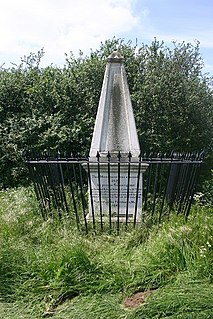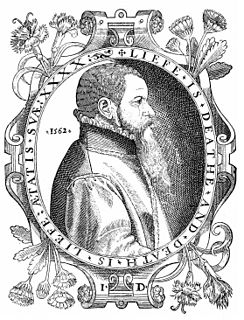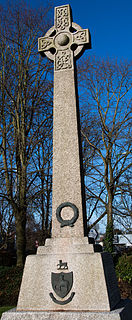Related Research Articles

Hugh Latimer was a Fellow of Clare College, Cambridge, and Bishop of Worcester before the Reformation, and later Church of England chaplain to King Edward VI. In 1555 under the Catholic Queen Mary he was burned at the stake, becoming one of the three Oxford Martyrs of Anglicanism.

John Foxe, an English historian and martyrologist, was the author of Actes and Monuments, telling of Christian martyrs throughout Western history, but particularly the sufferings of English Protestants and proto-Protestants from the 14th century and in the reign of Mary I. Widely owned and read by English Puritans, the book helped to mould British opinion about the Catholic Church for several centuries.

Rowland Taylor was an English Protestant martyr during the Marian Persecutions.

John Day was an English Protestant printer. He specialised in printing and distributing Protestant literature and pamphlets, and produced many small-format religious books, such as ABCs, sermons, and translations of psalms. He found fame, however, as the publisher of John Foxe's Actes and Monuments, also known as the Book of Martyrs, the largest and most technologically accomplished book printed in sixteenth-century England.

Robert Ferrar was a Bishop of St David's in Wales.

John Bradford (1510–1555) was an English Reformer, prebendary of St. Paul's, and martyr. He was imprisoned in the Tower of London for alleged crimes against Mary Tudor. He was burned at the stake on 1 July 1555.

The Oxford Martyrs were Protestants tried for heresy in 1555 and burnt at the stake in Oxford, England, for their religious beliefs and teachings, during the Marian persecution in England.

George Marsh was a Protestant martyr born in the parish of Deane near Bolton in 1515. He died in Boughton, Chester, on 24 April 1555 as a result of the Marian Persecutions carried out against Protestant Reformers and other dissenters during the reign of Mary I of England. His death is recorded in Foxe's Book of Martyrs.
Juan de Villagarcía was a Spanish Dominican from Valladolid, known as the witness to one of the statements of confession and recantation by Thomas Cranmer.

The Coventry Martyrs were a disparate group of Lollard Christians executed for their beliefs in Coventry between 1512 and 1522 and in 1555. Eleven of them are commemorated by a six-metre-high (20 ft) monument, erected in 1910 in a public garden in the city, between Little Park Street and Mile Lane; and by a mosaic constructed in 1953 inside the entrance to Broadgate House in the city centre. Some of the streets in the city’s Cheylesmore suburb are named after them.

Thomas Hawkes was an English protestant martyr who burned to death in 1555 during the Marian Persecutions rather than allow his son to be baptised into the Roman Catholic Church.

The Colchester Martyrs were 16th-century English Protestant martyrs. They were executed for heresy in Colchester, Essex, during the reigns of Henry VIII and Mary I. Their story is recorded in Foxe's Book of Martyrs.
Christopher Wade was an English Protestant martyr. His story is recorded in Foxe's Book of Martyrs.
The Canterbury Martyrs were 16th-century English Protestant martyrs. They were executed for heresy in Canterbury, Kent, and were the last protestants burnt during the reign of Mary I. Their story is recorded in Foxe's Book of Martyrs.
William Pygot was a sixteenth-century English Protestant martyr. His story was recorded in Foxe's Book of Martyrs. For denying transubstantiation, he was burned to death at Braintree, Essex, on 28 March 1555.

The Actes and Monuments, popularly known as Foxe's Book of Martyrs, is a work of Protestant history and martyrology by Protestant English historian John Foxe, first published in 1563 by John Day. It includes a polemical account of the sufferings of Protestants under the Catholic Church, with particular emphasis on England and Scotland. The book was highly influential in those countries and helped shape lasting popular notions of Catholicism there. The book went through four editions in Foxe's lifetime and a number of later editions and abridgements, including some that specifically reduced the text to a Book of Martyrs.
John Philpot (1516–1555) was an Archdeacon of Winchester and an English Protestant martyr whose story is recorded in Foxe's Book of Martyrs. He was the third son of Sir Peter Philpot and was born at Compton, Hampshire, in 1516.

The Stratford Martyrs Memorial is a memorial that commemorates the group of 11 men and two women who were burned at the stake together for their Protestant beliefs, at Stratford-le-Bow or Stratford near London in England on 27 June 1556, during the Marian persecutions.
References
- ↑ Anthony Boden (2005). Thomas Tompkins:The Last Elizabethan. p.46. Google Books, retrieved 31-10-10
- ↑ Boden, p.47
- ↑ p.249-251, John Foxe, Foxe's Book of Martyrs , 2000, Ambassador Publications
| This biography article of an English religious figure is a stub. You can help Wikipedia by expanding it. |